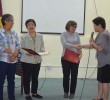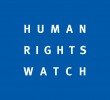(Hong Kong, May 31, 2007) � The Chinese government is backtracking
on new rules that allow much greater freedom to foreign journalists, and is
continuing to deny comparable freedoms to Chinese journalists, Human
Rights Watch said today.
Moreover, there are indications that a further tightening of restrictions on
the domestic media � already subject to systemic censorship and recurrent
crackdowns � is looming, and journalists’ sources are being targeted for
reprisal by local officials.
“The Chinese government is already failing to deliver on its pledge to
fully lift restrictions for foreign journalists ahead of the Beijing Games,”
said Sophie Richardson, deputy Asia director at Human Rights Watch.
“These arbitrary restrictions on press freedoms undermine the new
regulations, and raise questions about the government’s commitment to
implement them in the first place.”
The new freedoms are set out in the “Service Guide for Foreign Media,”
published on the Web site of the Beijing Organizing Committee for the
Olympic Games. That document states that “the Regulations on Reporting
Activities by Foreign Journalists shall apply to the coverage of the Beijing
Olympic Games and the preparation as well as political, economic, social
and cultural matters of China by foreign journalists, in conformity with
Chinese laws and regulations.” The temporary regulations are in effect
from January 1, 2007 until October 17, 2008.
But the new temporary regulations intentionally exclude domestic
journalists from enjoying such freedoms. Chinese citizens who work for
foreign media organizations in China are likewise excluded, as Chinese
law expressly forbids their citizens from working as journalists for foreign
publications or electronic media and relegates them instead to the roles of
“assistant” or “researcher.”
“There is no justification for denying to Chinese journalists even the
limited freedoms that their foreign colleagues enjoy,” said Richardson. “If
China is genuine about press freedom for the Olympics, it must also
emancipate its own journalists.”
While China’s constitution nominally guarantees “publishing freedom,” an
array of national media regulations which include vague and sweeping
prohibitions on the publication of material that “harms the honor or the
interests of the nation,” “spreads rumors,” or “harms the credibility of a
government agency,” are implicit threats to Chinese journalists who
pursue stories deemed sensitive by the government. According to the
Committee to Protect Journalists, China already jails more journalists than
any other country in the world, with some 30 known cases of journalists
currently imprisoned for their reporting activities.
Prominent lawyers representing civil rights and human rights cases have
also reported being given a blanket prohibition by state security agents
requiring them to stop talking to foreign media, and several localities have
adopted regulations prohibiting lawyers and court officials from talking to
the media.
“The Chinese government must acknowledge that the freedom to report is
not a privilege that can be subjected to the whims of local officials. It must
be consistently and unequivocally upheld in all situations,” said
Richardson.
Restrictions on Geography, Topics for Foreign Journalists
Despite the official pledge to allow foreign journalists to report freely
from across China, several foreign journalists report having been told that
in fact there are certain areas or regions they still cannot visit and certain
subjects they cannot cover.
In March 2007, the military stopped BBC correspondent James Reynolds
from reporting on the aftermath of a riot in Hunan province, telling him
the new regulations were “only for Olympics-related stories.” In at least
four other instances since January 1, foreign correspondents have been
stopped or detained in areas including villages of HIV-AIDS sufferers in
Henan province and along China’s border with North Korea. The
responsible state security personnel were either unaware of or unwilling to
abide by the new regulations. Those journalists were released only after
urgent phone calls to Ministry of Foreign Affairs officials demanding that
local police respect their reporting freedom.
“We are encouraged by indications that China’s government has shown a
willingness on certain occasions to ensure that officials at the grassroots
enforce these new freedoms for foreign correspondents when pressed to do
so,” Richardson said. “But this should obviously be the rule for all
journalists, not the exception.”
Several foreign correspondents have been refused access to Tibet, a region
with a long history of Chinese repression and for which journalists and
tourists alike have long had to obtain special permission to visit. At a
regular Ministry of Foreign Affairs press conference in February, an
unidentified foreign correspondent stated that several journalists had
recently been refused permission to visit despite the temporary regulations,
and asked whether the regulations extended to coverage of Tibet.
Ministry of Foreign Affairs spokeswoman Jiang Yu on February 13
justified the refusals as necessary due to unspecified “restraints in natural
conditions and reception capacity” in Tibet, and said that foreign
correspondents must still get permission from local authorities to report
from the region despite the new temporary regulations. Other journalists
who have taken the Chinese government’s temporary regulations on
reporting freedom at their word and traveled to Tibet independently
without official permission have been subsequently summoned and
criticized by the Ministry of Foreign Affairs in Beijing, which is
responsible for the accreditation of foreign journalists.










